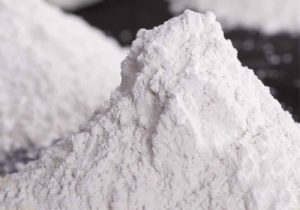
CP-10 Organoclay
CP-10 organoclay is a rheological additive made of organoclay. It is used in non-polar to moderately polar aliphatic and other solvent systems
Organoclay Chemistry : Organic bentonite clay can remove oil from water. The organic clay bentonite produced by Camp Shinning, in addition to the effect of removing oil in water, can also be used as the main additive in paint formulations. Its main component is bentonite, which has the effect of thixotropy and rheology.
In oil based drilling fluids, it is widely used as a viscosifier gelling agent.
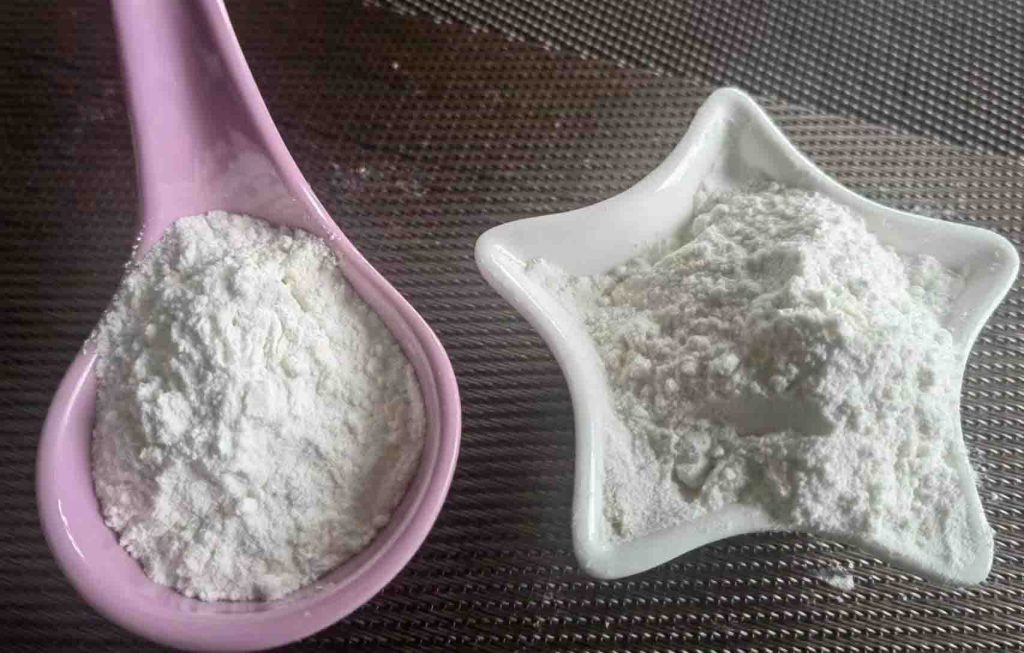

CP-10 organoclay is a rheological additive made of organoclay. It is used in non-polar to moderately polar aliphatic and other solvent systems

CP-MPZ organoclays is an modified bentonite that is used in solvent and resin systems ranging from non-polar to highly polar.

The CP-MPS rheology modifier is a type of organo clay rheological additive that is used in solvent and resin systems ranging from non-polar to high polarity.
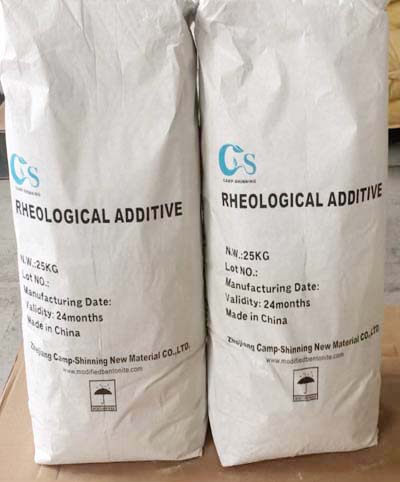
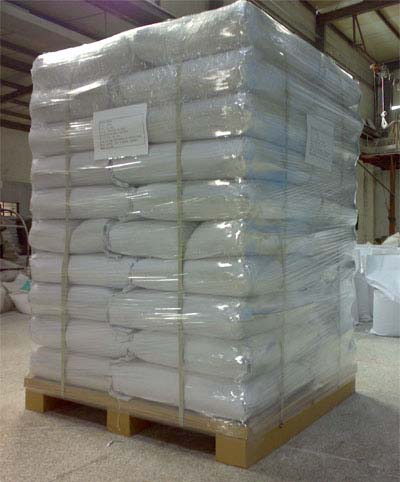
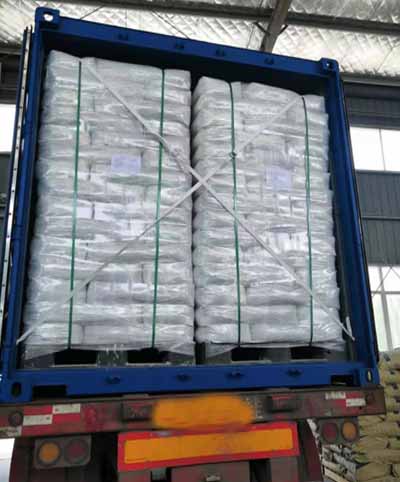
Organoclay Chemistry : In search of a more efficient product thickening method?
It’s intriguing that our bentonite clay can help you produce thicker goods more quickly without sacrificing quality. In fact, our products have proven to have some of the best performance indicators in the industry.
There isn’t currently a more reliable.
Organoclay Supplier / Manufacturer :
Internet address: https://www.rheologymodifiers.com/
Email address: [email protected]
Whatsapp / Wechat: +86-13185071071
Organophilic Clay Supplier / Manufacturer :

CP-EW Organoclay for Water Based paint. It is primarily employed in water borne paint systems,such as latex paint. So it is a good water based additive in paints,coatings,grease etc.

CP-EWS Modified bentonite It is employed in a water-borne coatings system. CP-EWS organoclay outperforms CP-EW in terms of thixotropy, transparence, and dispersion.

CP-WBS Rheology Modifier is rheological modified bentonite. It is mostly employed in water-borne systems.


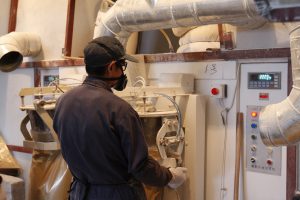
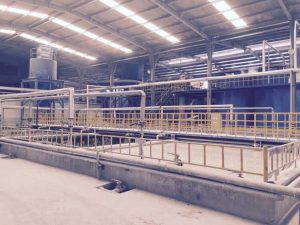

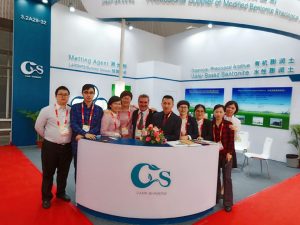
The Organoclay bentonite | Organophilic clay -specialized Zhejiang Camp-Shinning New Material CO.,LTD. and Hangzhou Camp-Shinning CO.,LTD. are subsidiaries of Camp-Shinning.
Camp-shinning concentrated on high value-added, high-technology organo bentonite series products, particularly in research, development, manufacturing, and sales of organic (solvent based organoclay) and inorganic bentonite (water based organoclay).
Our Organophilic bentonite clay finds widespread application in oil drilling mud, paint, coating, lubricating grease, adhesive, construction mortar, cosmetics, and waste water treatment, among other applications. A group of world-class professional users and distributors, such as SUN CHEMICAL,,SIEGWERK,LEHMANN &VOsS, and others, have acknowledged our dependable quality.
Current annual production of organic bentonite clay | organoclay is 20,000 metric tons, while refined bentonite production is 15,000 metric tons.
Our ISO 9001 quality system certification and IS014001 environmental management system certification, as well as our own mine with superior ore quality and production of proprietary technology, ensure the long-term quality and supply stability of our Organoclay bentonite | Organophilic clay.
Our mission is to provide users with superior Organoclay bentonite | Organophilic clay and services and to collaborate with them to achieve success and glory.
Internet address: https://www.rheologymodifiers.com/ and email address: [email protected]
Whatsapp / Wechat: +86-13185071071
Organoclay | Organophilic Clay CP-2 also named amine treated Bentonite.
In diesel oil based fluids,organophilic clay viscosifier CP-2 are used to increase carrying capacity and suspension properties, providing support for weight materials and improved cutting removal. Organophilic bentonite also aids in filter-cake formation and filtration control.
Properties
Composition Organically modified bentonite clay
Physical appearance Off white to tan free-flowing powder
Moisture content (105℃,2hr) ≤4%
Particle size (<76μm or 200mesh) ≥95%
Specific Gravity 1.6-1.8
Advantages
Effective viscosifier and gellant
Aids control of fluid loss to the formation
Increases emulsion stability
Improves cuttings carrying and hole cleaning capacity
Suspends weighting materials and other solids
Confers temperature stability to the fluid
Application
Base oil:
Diesel Oils
Crude Oils
Mineral Oils
Synthetic Oil
Viscosifying drilling Fluids:
Oil based drilling fluids
Invert emulsion fluids
Workover fluids
Completion fluids
Casing packs
Packer fluids
Spotting fluids
Package
Organoclay | Organophilic Clay CP-2 is packed in 50lb(22.7kg) or 25kg/bag or customized,multi-wall paper sacks or Kraft paper bag with PE liner or customized.
Storage
CP-2 Store in a dry, well-ventilated area with temperature of 0℃-30℃. Keep container closed. The quality guarantee period is 24 months.
Notice
The information on use is based on data which are believed reliable, but any recommendation or suggestion made is without guarantee or warranty, since the conditions of use are outside our control. All products are sold on the conditions that purchasers shall make their own tests to determine the suitability of such products for their purpose and that all risks are assumed by user. We disclaim any responsibility for damages resulting from careless or improper handling or use. Nothing herein is to be taken as permission, inducement or recommendation to practice any patented invention without a license.
Internet address: https://www.rheologicaladditive.com/ and email address: [email protected]
Whatsapp / Wechat: +86-13185071071
Organoclay Chemistry
Organoclay Chemistry
If you are contemplating the purchase of organoclay bentonite, there are a number of things you should be aware of beforehand. These include how to purchase organoclay, its applications, and price range. In addition, you should be familiar with organoclay’s applications in mineral drilling and water treatment.
Organoclay bentonite price
The price of organoclay bentonite might vary based on the material’s kind and purity. A kilogram of drilling bentonite, for instance, can be sold for between $1.70 and $3.20, but the general solvent version can fetch a higher price. Diverse vendors employ distinct pricing techniques and procedures. The objective is to locate a trustworthy supplier that can provide organoclay of superior quality at cheap pricing.
Organoclay bentonite is also referred to as “organic bentonite” and “Organoclay Chemistry.” Its hue is mostly determined by the type of bentonite ore from which it is extracted. This is a naturally occurring mineral that has industrial applications.
Organoclay Chemistry
In the drilling and oil field industries, organoclay bentonite is commonly used. Its qualities make it a great material for preventing settling and sagging. Additionally, it is used in the paint industry. It is reasonably priced in comparison to other materials. However, it has several disadvantages.
Bentonite made from organoclay is a great lubricant for construction materials. It enhances their lubricity and viscosity, hence enhancing the building process. Additionally, it decreases drilling pressure, which can shorten drilling time and improve drilling efficiency. Organoclay bentonite is user-friendly.
Organoclay bentonite is often white and has less iron than natural bentonite. The color white denotes a high level of purity and application value. Nonetheless, there are types that are red or yellow, and this does not impact its performance.
The oil removal effectiveness of organoclay bentonite has been the subject of multiple investigations.
Organoclays are inexpensive and need minimal raw resources to manufacture. Their production costs are less than those of other sorbent materials, and they may be produced in existing large-scale facilities.
Organoclay Chemistry
Application in drilling for mineral
Compositions of organoclay can be utilized to produce drilling fluids with high viscosity and gel strength. These fluids can be utilized for drilling at high temperatures and are environmentally safe. Typically combined with surfactants and water, they can be added to oil-based drilling fluids.
Organoclay compositions consist of a mineral clay or mixture that has been subjected to a chemical reaction to form a stable product. An alkyl or alkenyl quaternary ammonium compound is added to the mixture throughout the chemical process. The rheological qualities of this synthesized chemical surpass those of commercial additives.
Organoclay is utilized frequently in drilling fluids and road paints. During storage, these materials must be able to maintain a pigment suspension. For certain purposes, other qualities are less significant. However, many other materials and processes require organoclays with good performance. Organoclay Chemistry is also utilized in printing ink, industrial coatings, and cosmetics.
Some drilling fluids can consist of an oil-based, invert emulsion fluid and an organoclay composition. In addition to an acid gas scavenger, emulsifier, weighing agent, and corrosion inhibitor, these fluids may also contain an acid gas absorber. In addition, organoclay compounds can be utilized as coatings, molding compounds, and sealants.
Organoclay has been used for many years to manage the rheology of oil-based continuous fluids. However, their efficacy in diesel oil systems varies substantially. This is owing to the chemical difference between oil and diesel, as well as the addition of various surfactants to diesel fuel. Additionally, there is a restricted supply of additive-free fuel for mineral drilling.
Organoclay Chemistry is a combination of clay mineral morphologies and surfactant chemistry that stabilizes oil-based drilling fluids at elevated temperatures and pressures. Montmorillonite clay is a prevalent material in mineral drilling, however its high initial characteristics render it unstable at elevated temperatures.Organoclay Chemistry made with a mixture of quaternary ammonium compounds, on the other hand, offer equivalent or enhanced stability.
Zhejiang Camp-Shinning New Material Co., Ltd. is the manufacturer of organoclay. This procedure is both energy efficient and wasteless. A mixture of organoclay, emulsifiers, brine, and other chemicals are utilized in the process.
Organoclay Chemistry
Organoclay applications in water treatment
There are numerous applications for organoclay in water treatment.
Single molecules or cationic surfactants can be used to create organoclay.
Organoclay’s capacity to dissolve hydrocarbons in water is a further significant application. During the production process, amines are incorporated into the clay. These amines reduce the surface tension of liquids, allowing clay to react with previously incompatible compounds. For instance, oil does not dissolve in water, but it does in organoclay.
Organoclay is a composite composed of clay particles and chemical molecules. Its interaction with surfactants improves the adsorption capabilities of numerous chemical molecules. Additionally, it is useful as a reinforcing material in polymer nanocomposites.
The most significant industrial application of organoclay is desulfurization by adsorption. This method is applicable to both mesoporous and microporous materials. Furthermore, it is effective at removing organic pollutants from wastewater. This technology is frequently employed in water treatment facilities across the globe.
Organoclay Chemistry is a crucial component of the produced water treatment business in the oilfield. Additionally, it is compatible with granular activated carbon. Mixing sodium montmorillonite clay with cationic quaternary amine salt produces it.
Organoclay Supplier / Manufacturer :
Internet address: https://www.rheologymodifiers.com/
Email address: [email protected]
Whatsapp / Wechat: +86-13185071071
Organophilic Clay Supplier / Manufacturer :

CP-180 organoclay is an organo clay rheological additive (modified montmorillonite) designed specifically for use in solvent-based systems

CP-34 organoclay is a modified bentonite that has been specifically designed for use in solvent-based systems.

CP-EDS modified bentonite is a kind of organo clay rheological additive. It is used in systems of medium polarity and high polarity system.

CP-992 Organophilic Clay, the wet process improved viscosifier and gelling agent . It is a rapidly dispersing.

CP-982 Organophilic Clay is an amine treated bentonite with a moderate temperature performance.

CP-150 Organophilic Clay is a self-activating organoclay that disperses easily and performs well in diesel, low aromatic mineral oil, modified vegetable oil, and synthetic base fluid formulations.
Organoclay Chemistry, organoclay bentonite